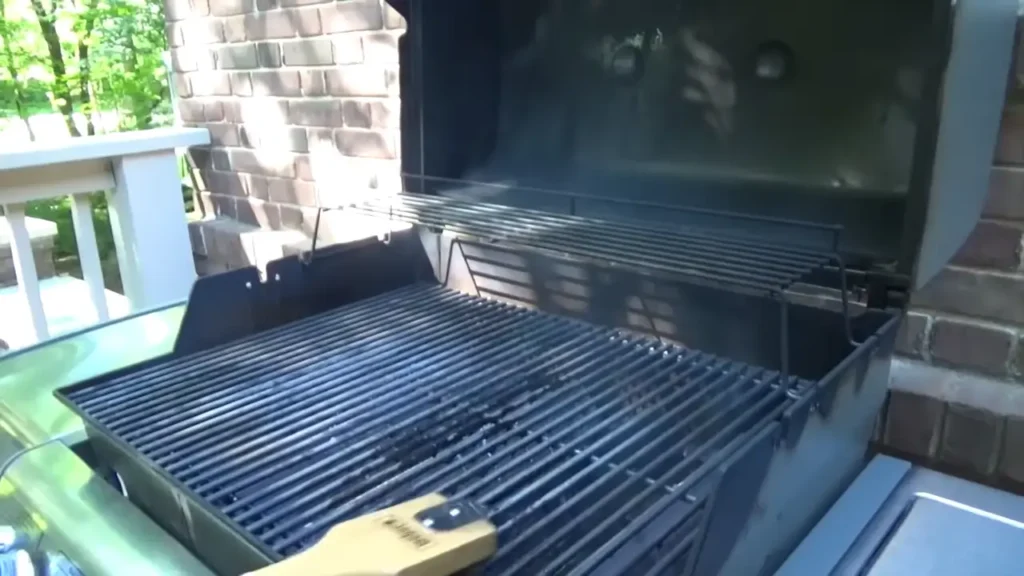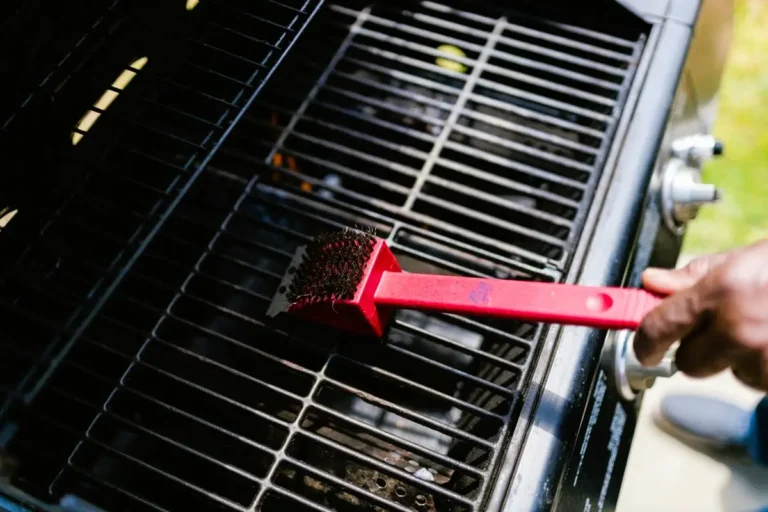I. Introduction
clean grill grates are essential for ensuring the best cooking results and prolonging the life of your grill, whether you’re a seasoned grill master or a weekend barbecue enthusiast. This introduction will discuss the importance of cleaning grill grates and the benefits of regular maintenance.
A. Importance of Cleaning Grill Grates
Cleaning your grill grates is crucial for several reasons:
- Food Safety: Clean grill grates reduce the risk of bacterial growth and prevent old food particles from contaminating what you cook.
- Improved Cooking Performance: A clean grill ensures even heating and better thermal conductivity. Grime and grease buildup can cause hot spots and uneven cooking surfaces, which can lead to improperly cooked food.
- Flavor Preservation: Clean grates prevent old, burnt flavors from spoiling the taste of fresh food. Accumulated burnt residues can impart a bitter flavor to foods that are meant to be savory and delicious.
- Prevention of Flare-Ups: Grease and fat buildup on grates can ignite, causing flare-ups. These sudden bursts of flame are not only dangerous but can also burn your food, making it unappealing and potentially inedible.
- Extended Grill Lifespan: Regular cleaning helps prevent the corrosive effects of burnt grease and food residues, thereby extending the life of grill grates and the grill itself.
B. Benefits of Regular Maintenance
Regular maintenance of your grill has numerous benefits:
- Consistency in Cooking: A well-maintained grill provides consistent performance each time it’s used, leading to predictable and reliable cooking results.
- Cost Efficiency: By prolonging the life of your grill, regular maintenance helps avoid the frequent costs of replacing parts or the entire grill.
- Enhanced Aesthetics: A clean grill is visually appealing and can be a point of pride, enhancing the overall experience of outdoor cooking.
- Ready to Use: A clean and well-maintained grill is always ready for impromptu barbecues, reducing prep time and stress when the occasion to grill arises.
- Safety: Regular maintenance includes checking for gas leaks, structural integrity, and other safety concerns, which can prevent accidents.
Understanding the importance of clean grill grates and committing to regular maintenance not only enhances your grilling experience but also ensures that every barbecue is a success, both in terms of the food’s flavor and the safety of the cooking environment. Up next, we’ll explore practical steps and methods for effectively cleaning your grill grates and maintaining your grill in optimal condition.

II. Preparing for Cleaning
Proper preparation is key to effectively and safely cleaning your grill. This section will guide you through gathering the necessary supplies and implementing safety measures before you begin the cleaning process.
A. Gathering Necessary Supplies
To ensure a thorough cleaning of your grill grates and other components, you’ll need to have the right tools and cleaning agents on hand. Here is a list of essential supplies:
- Grill Brush: A good quality grill brush with stiff bristles (stainless steel or brass, depending on the type of grate) is crucial for scrubbing away burnt-on food and grease. Alternatively, a grill stone or a wooden scraper can be used, especially for porcelain-coated grates to avoid scratching.
- Cleaning Solution: You can use a commercial grill cleaner designed specifically for removing tough residues or make a DIY cleaner with vinegar and baking soda, which is effective and more environmentally friendly.
- Scouring Pads/Sponges: Non-metallic scouring pads or steel wool can be used for areas that need extra scrubbing. Be cautious with steel wool on porcelain grates to avoid scratching.
- Disposable Gloves: Wear gloves to protect your hands from grease, grime, and the chemicals in cleaning agents.
- Dish Soap: Mild dish soap helps cut through grease and can be used for a less abrasive clean or for soaking parts of the grill.
- Plastic Putty Knife: Useful for scraping off hardened grease and debris without damaging the grill surfaces.
- Paper Towels or Rags: Essential for wiping down and drying surfaces after cleaning.
- Trash Bags: Have a trash bag handy to dispose of debris, dirty rags, and other waste materials.
- Aluminum Foil: Useful for covering areas to keep them clean or for trapping heat when burning off excess grease.
- Garden Hose or Buckets of Water: Needed for rinsing, especially if you’re cleaning your grill outdoors.
B. Ensuring Safety Measures
Safety is paramount when cleaning a grill, particularly to prevent fire hazards and personal injury:
- Cool Down: Ensure the grill is completely cool before you begin cleaning to avoid burns.
- Gas Supply: If you are using a gas grill, disconnect the propane tank or turn off the natural gas supply to eliminate any risk of fire or gas leakage.
- Ventilation: Work in a well-ventilated area, especially if using chemical cleaners. Outdoor cleaning is ideal.
- Stable Surface: Make sure the grill is on a stable, flat surface to prevent it from tipping over while you’re cleaning.
- Protective Gear: Wear gloves to protect your hands from sharp edges and caustic cleaners. Consider eye protection if using spray cleaners to guard against splashes.
- Check for Gas Leaks: After reconnecting the gas, apply a soapy water solution to the hose and connections. Bubbles forming indicate a leak and should be addressed before using the grill.
By properly preparing and ensuring that you have all necessary supplies and safety measures in place, you can make the grill cleaning process efficient, effective, and safe. With your grill clean and maintained, you’re ready for a season full of successful barbecuing. Next, we’ll explore the step-by-step process of cleaning the grill grates and the grill itself to ensure optimal performance and longevity.
III. Removing Residue
Once you’ve prepared your grill for cleaning and gathered the necessary supplies, the next step is to effectively remove built-up grease, food particles, and other residues. This section provides detailed guidance on how to scrub the grill using a wire brush and the use of cleaning solutions to achieve a thorough clean.
A. Scrubbing with a Wire Brush
Scrubbing the grates with a wire brush is one of the most effective methods to remove burnt-on food and grease. Here’s how to do it properly:
- Choose the Right Brush: Use a high-quality wire brush suitable for your type of grill grate. For stainless steel grates, a stainless steel wire brush is ideal, while brass brushes are recommended for porcelain or enamel-coated grates to avoid scratching.
- Heating the Grill: If possible, heat the grill for 10-15 minutes before scrubbing. The heat will help to loosen the residue, making it easier to scrape off.
- Scrubbing Technique:
- Direction: Always scrub in the direction of the grates to prevent damage. This also helps to get between the grates more effectively.
- Pressure: Apply firm pressure while scrubbing but be mindful not to distort or damage the grates.
- Coverage: Make sure to cover all areas, including the sides and undersides of the grates.
- Post-Scrub Check: After scrubbing, inspect the grates for any remaining residue. If stubborn spots persist, consider a second pass or use a putty knife or scraper to gently remove them.
- Rinse: Once the scrubbing is complete, rinse the grates thoroughly with water to remove any loose debris and particles left by the brush.
B. Using Grill Cleaning Solutions
For deeper cleaning or to tackle especially tough residues, grill cleaning solutions can be very effective. Here’s how to use them safely and effectively:
- Choosing a Cleaner: Select a commercial grill cleaner designed for the type of grill you have, or opt for a natural cleaner like a mixture of vinegar and baking soda. Always check the manufacturer’s recommendations to avoid damaging your grill.
- Application:
- Spray or Apply: If using a commercial spray, apply it directly to the grates and other greasy surfaces. For homemade solutions, you can use a spray bottle or a brush to apply.
- Let It Sit: Allow the solution to sit for several minutes, as per the instructions on the cleaner. This dwell time helps break down the grease and grime.
- Scrubbing: After the cleaner has had time to work, use a wire brush or scouring pad to scrub the grates and interior surfaces. The cleaner will make this process easier by loosening the residue.
- Rinsing: Thoroughly rinse the grill with water to remove all traces of the cleaner. This is crucial to prevent chemical residues that could affect the taste of your food.
- Drying: Dry the grill and grates with a clean cloth or allow them to air dry before the next use.
- Safety Precautions: When using chemical cleaners, wear gloves and work in a well-ventilated area to protect yourself from fumes.

IV. Soaking Method
For particularly stubborn grill grime or when you want to give your grill grates a deeper clean, soaking can be an effective method. This section covers the steps for soaking grill grates in soapy water and using a vinegar solution, which can help dissolve grease and make the cleaning process less labor-intensive.
A. Soaking in Soapy Water
Soaking grill grates in soapy water helps loosen burnt-on food and grease, making them easier to clean. Here’s how to do it effectively:
- Preparation:
- Remove the Grates: Ensure the grill is cool and safely remove the grates.
- Find a Suitable Container: Use a large basin, a utility sink, or a custom-sized container that can fit the grates. For larger grates, you might need to use a bathtub or an outdoor utility tub.
- Mixing the Solution:
- Water: Fill the container with hot water, enough to completely submerge the grates.
- Soap: Add a generous squirt of dish soap to create a sudsy solution. The grease-cutting properties of the dish soap will help break down the grime.
- Soaking:
- Immerse the Grates: Place the grates in the soapy water. Ensure they are fully submerged.
- Duration: Let them soak for at least 30 minutes, though several hours or overnight is ideal for very dirty grates.
- Scrubbing:
- After soaking, use a grill brush or a scouring pad to scrub the grates. The residue should come off much more easily now.
- Rinsing and Drying:
- Thoroughly rinse the grates with clean water to remove any soap residue.
- Dry the grates completely with a towel or allow them to air dry to prevent rust.
B. Utilizing Vinegar Solution
Vinegar, especially white vinegar, is effective due to its acidity, which helps to dissolve grease and burnt-on food. Here’s how to use it:
- Prepare the Vinegar Solution:
- Mixing: Combine equal parts of white vinegar and water in a large container or spray bottle.
- Enhancements: You can add a few drops of dish soap to the mixture for extra grease-cutting power.
- Application:
- Spray or Submerge: If using a spray bottle, liberally spray the grates with the vinegar solution. For deeper cleaning, submerge the grates in a container filled with the vinegar solution.
- Soak Time: Let the grates sit in the solution for at least 30 minutes to a few hours. For very grimy grates, overnight soaking might be necessary.
- Scrubbing and Rinsing:
- After soaking, use a grill brush or scouring pad to scrub off the loosened debris.
- Rinse the grates thoroughly with water to ensure all vinegar is washed off, as residual vinegar can affect the taste of your food.
- Drying:
- Ensure the grates are completely dry before placing them back on the grill to prevent rusting.
Tips for Effective Soaking:
- Regular Maintenance: Incorporate soaking into your regular grill maintenance routine to prevent buildup and reduce the need for intensive scrubbing.
- Check Material Compatibility: Ensure that the materials of your grill grates are compatible with soaking, especially if using vinegar, as some coatings on grates might be sensitive to acidic solutions.
V. Heat Treatment
Heat treatment is an effective method for cleaning grill grates and involves using the grill’s own heat to burn off food residue and grease. This process simplifies the cleaning of tough, baked-on grime and can significantly reduce the need for harsh chemicals or excessive scrubbing. Here’s how to perform a heat treatment on your grill:
A. Heating Up the Grill
- Preparation:
- Open the Grill: Ensure the grill lid is open to start, to prevent gas buildup if you are using a gas grill.
- Check for Safety: Ensure all flammable materials are clear from the grill area.
- Igniting the Grill:
- Gas Grills: Turn on the gas supply and ignite the grill using the starter button. If the grill doesn’t have an automatic ignition, use a long lighter to safely light the burners.
- Charcoal Grills: If using charcoal, stack the charcoal in a mound or pyramid and light it with a lighter fluid or a chimney starter. Wait until the charcoal is covered with a white ash indicating it is hot enough.
- Setting the Temperature:
- High Heat: Set the grill to a high temperature (around 500°F to 600°F). High heat is crucial for effectively burning off residue.
B. Burning Off Residue
- Heat the Grill:
- Once the grill reaches high heat, close the lid and let it run for about 15 to 20 minutes. The high temperature will turn any leftover food and grease into ash.
- Monitor the Process:
- Keep an eye on the grill while it’s heating to ensure no flare-ups or excessive smoke occur. Adjust the temperature if necessary.
- Scrubbing Post Burn-Off:
- After the set time, turn off the grill and let it cool down just enough to handle safely but still warm. Use a grill brush to scrub off the ash and any remaining debris. The grates will be much easier to clean after the burn-off, as most of the residue will have turned to ash.
- Final Heating:
- Once you have scrubbed the grates, heat the grill again for about 5 minutes to burn off any remaining particles and to ensure that the grates are clean.
- Cool Down and Inspect:
- Turn off the grill and let it cool completely. Once cool, inspect the grates to ensure all residue has been removed. If spots remain, a metal scraper or putty knife can be used to gently scrape these areas.
- Rinse if Necessary:
- In some cases, you might want to rinse the grates with water after they’ve cooled completely to remove any loose ash or debris. Dry thoroughly after rinsing to prevent rust.
Benefits of Heat Treatment:
- Sanitization: The high heat not only cleans but also sanitizes the grates, killing bacteria and other pathogens.
- Convenience: This method uses the grill’s own capabilities to clean itself, reducing the need for external cleaning agents.
- Efficiency: Burning off residue is efficient for regular maintenance and helps keep your grill ready for its next use with minimal effort.
AFQs
- Question: What is the best way to clean grill grates?
Answer: Scrubbing with a wire brush after heating the grill is an effective method for cleaning grill grates. - Question: Is it OK not to clean grill grates?
Answer: It’s not advisable; clean grill grates prevent food from sticking and help maintain flavor. - Question: Does vinegar and baking soda clean grill grates?
Answer: Yes, soaking grates in a solution of vinegar and baking soda can help loosen grime for easier cleaning. - Question: Can aluminum foil clean the grill grates?
Answer: Yes, crumpling aluminum foil and scrubbing the grates with it can help remove residue and debris.

